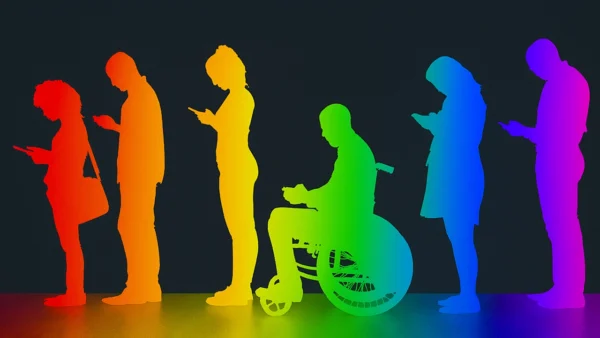So You Want to Be an Actor (and You Happen to Have a Disability)?
First off, welcome to the club. Not the disability club (though hey, solidarity!) — the actor club. A strange, wonderful tribe of humans who are brave enough to perform in front of strangers, cry on cue, and spend their lives chasing gigs that last three days and pay in leftover pizza. And yes, this industry absolutely needs more actors with disabilities — or as many in the community prefer, disabled actors. Yep, identity-first language is widely embraced, but there’s nuance: Some prefer “people with disabilities.” When in doubt, ask. But for this post, we’ll use “disabled actors,” as it’s the more commonly preferred term within the performing arts activist circles.
Step One: You Don’t Need Permission
Let’s get something clear. You do not need to be cast as “Disabled Person #2” in a hospital drama. You can be the romantic lead. The villain. The scientist. The wizard. The space pirate. Your disability isn’t a limitation — it’s an authenticity filter. You bring something to a role that no able-bodied actor ever could. That’s not a setback. That’s power.
Step Two: Training Still Matters
You don’t get a shortcut just because the industry hasn’t caught up yet. Take classes. Learn script analysis, camera technique, auditioning, improv. Voice training too — especially if your disability affects speech. There are acting coaches and schools that prioritize accessibility. Look for those. Or call them and ask, “Will your program work with my needs?” If the answer is no, keep moving. Your talent deserves better.
Step Three: Find Your Tribe
Being in community with other disabled performers is a game changer. You’ll find support, collaboration, and advocacy networks. Some of the top orgs and events include:
- Easterseals Disability Film Challenge – Create and compete with short films by and about disabled people. Bonus: Industry eyes are on it.
- Disability Media Alliance Project (DMAP)
- Inevitable Foundation – Supports disabled screenwriters and content creators, but also connects talent.
- RespectAbility – Training, networking, and media watchdog support.
Step Four: Build a Killer Actor Toolkit
- Headshots – Keep them professional, not gimmicky. If your disability is visible, don’t hide it. Lead with it. Let your expression show your range.
- Demo Reel – Don’t wait for the industry to come to you. Shoot short scenes that highlight your range. Don’t just do “disability roles.” Show off your depth.
- Résumé – Include training, special skills (wheelchair acrobatics? prosthetic sword fighting?), and any disability-specific film or TV work.
Step Five: Representation Matters… and So Do Reps
Finding the right agent or manager can be tough, but there are a handful of agencies committed to inclusive casting and disabled talent. Here are the main players, sorted by city:
📍 Los Angeles
- KMR Talent (Kazarian/Measures/Ruskin) – Kayte O’Malley leads their Diversity & Inclusion department. They actively rep disabled actors for major network projects. (kmrtalent.com)
- Gamut Management – 100% focused on disabled and neurodiverse talent. Excellent advocate agency. (gamutmanagement.com)
- Zebedee Talent USA – Originated in the UK, now expanding in the U.S. They rep a wide range of body types and disabilities. (zebedeetalent.com)
📍 New York City
- CESD Talent – One of the big agencies that has started repping inclusively, including several disabled actors. (cesdtalent.com)
- Authentic Talent & Literary Management – Not disability-exclusive, but they’re open and flexible. (authenticm.com)
📍 Atlanta
- People Store – One of the top Atlanta agencies, known for supporting inclusive talent in the booming Southeast market. (peoplestore.net)
- Aloma’s Talent – Boutique agency that has repped talent with disabilities. (alomas.com)
📍 San Francisco
- Look Talent – Represents diverse and inclusive talent, with some disabled performers on their roster. (looktalent.com)
- JE Talent – Voice and on-camera agency that embraces disability and neurodivergence in authentic casting. (jetalent.com)
📍 Seattle
- Big Fish NW – Inclusive casting and strong connections to Pacific Northwest productions. (bigfishnw.com)
- TCM Models & Talent – Works with a wide variety of looks and body types; open to disability representation. (tcmmodels.com)
📍 Miami
- DAE Talent – Miami-based, works across Florida. Known for regional commercial work and indie film. (daetalent.com)
- MC2 Miami – Large agency with growing interest in diverse and inclusive talent. (mc2mm.com)
📍 Dallas
- The Campbell Agency – Leading talent agency in Dallas that is receptive to inclusive representation. (thecampbellagency.com)
- Kim Dawson Agency – Known for developing new talent in both commercial and theatrical markets. (kimdawsonagency.com)
📍 Chicago
- Stewart Talent – Nationally respected, with a track record for inclusive casting. (stewarttalent.com)
- Grossman & Jack Talent – Reps actors for film, TV, and voice-over. Known to be inclusive and welcoming. (grossmanjack.com)
Step Six: Create While You Wait
The harsh truth: you may not be cast right away. So cast yourself. Start a YouTube channel. Film sketch scenes. Document your acting journey on TikTok. Show the industry what it’s missing by not hiring you yet. Bonus: it builds an audience, and casting directors notice people who make noise.
Breakouts for Specific Disabilities
♿ Actors Who Use Wheelchairs
- Make sure headshots show you seated naturally.
- Reels should include any specific skills: stunts, sports, dancing, etc.
- Work on projecting confidence, not just vulnerability — show range.
🧠 Neurodivergent Actors (Autism, ADHD, etc.)
- Find coaches familiar with neurodiversity. You don’t need to conform to neurotypical rhythms — your timing may be part of your charm.
- Advocate for reasonable accommodations: script access, schedule support, etc.
🧏 Deaf/HOH Actors
- Include ASL as a special skill if applicable.
- Ensure reels demonstrate expressive physical acting if using sign language.
🦻 Actors with Speech Differences
- Work with a voice coach, but don’t erase your natural sound unless it’s for clarity.
- Audition for voice-over roles that celebrate unique vocal tone and cadence.
Last Thoughts: Be Unapologetically You
Hollywood is changing. Slowly, but surely. Disabled actors are no longer being pushed to the sidelines. You’re the future of film and TV — not an exception, but an evolution. Take up space. Tell your story. And keep showing up until they realize they can’t tell stories without you anymore.
You’ve got this. And if you ever forget that, come back here and read this line again.
You. Belong. Here.
If you read this far, you might be interested in these:
VO: MENTORS & INFLUENCES
AI: TO THE ASPIRING VA
BEGINNERS VO GUIDE
PIONEERING DISABLED/NEURODIVERGENT ACTORS









